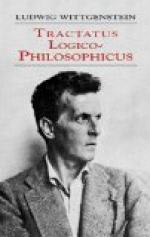L.W. Vienna, 1918
1 The world is all that is the case.
1.1 The world is the totality of facts, not of things.
1.11 The world is determined by the facts, and by their being all the facts.
1.12 For the totality of facts determines what is the case, and also whatever is not the case.
1.13 The facts in logical space are the world.
1.2 The world divides into facts.
1.21 Each item can be the case or not the case while everything else remains the same.
2 What is the case—a fact—is the existence of states of affairs.
2.01 A state of affairs (a state of things) is a combination of objects (things).
2.011 It is essential to things that they should be possible constituents of states of affairs.
2.012 In logic nothing is accidental: if a thing can occur in a state of affairs, the possibility of the state of affairs must be written into the thing itself.
2.0121 It would seem to be a sort of accident, if it turned out that a situation would fit a thing that could already exist entirely on its own. If things can occur in states of affairs, this possibility must be in them from the beginning. (Nothing in the province of logic can be merely possible. Logic deals with every possibility and all possibilities are its facts.) Just as we are quite unable to imagine spatial objects outside space or temporal objects outside time, so too there is no object that we can imagine excluded from the possibility of combining with others. If I can imagine objects combined in states of affairs, I cannot imagine them excluded from the possibility of such combinations.
2.0122 Things are independent in so far as they can occur in all possible situations, but this form of independence is a form of connexion with states of affairs, a form of dependence. (It is impossible for words to appear in two different roles: by themselves, and in propositions.)
2.0123 If I know an object I also know all its possible occurrences in states of affairs. (Every one of these possibilities must be part of the nature of the object.) A new possibility cannot be discovered later.
2.01231 If I am to know an object, thought I need not know its external properties, I must know all its internal properties.
2.0124 If all objects are given, then at the same time all possible states of affairs are also given.
2.013 Each thing is, as it were, in a space of possible states of affairs. This space I can imagine empty, but I cannot imagine the thing without the space.
2.0131 A spatial object must be situated in infinite space. (A spatial point is an argument-place.) A speck in the visual field, thought it need not be red, must have some colour: it is, so to speak, surrounded by colour-space. Notes must have some pitch, objects of the sense of touch some degree of hardness, and so on.




